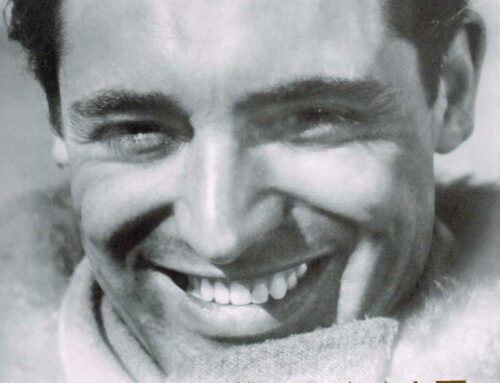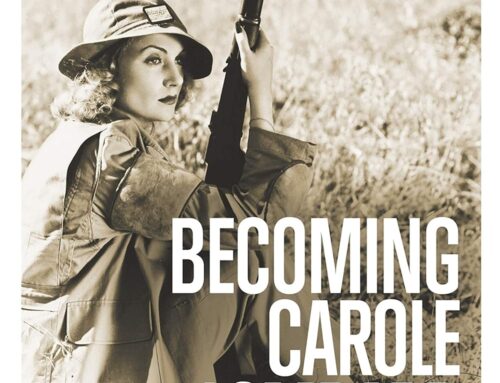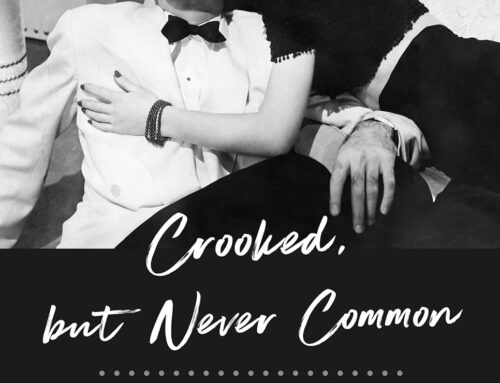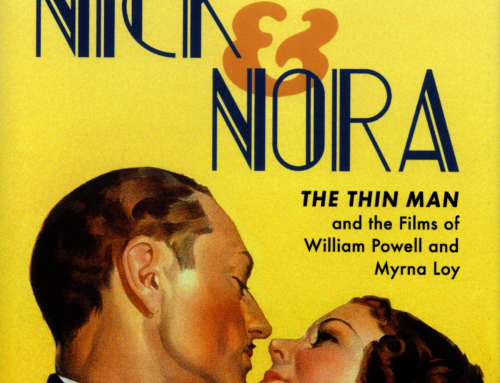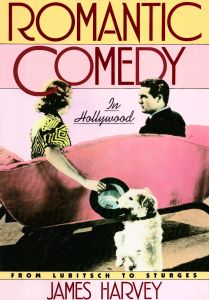
ROMANTIC COMEDY IN HOLLYWOOD, FROM LUBITSCH TO STURGES (1987) James Harvey
In 1934 four movies—It Happened One Night, Twentieth Century, The Thin Man, and The Gay Divorcee—ushered in the golden age of the Hollywood romantic (“screwball”) comedy. Slangy, playful, and “powerfully, glamorously in love with love,” the films that followed were unique in their combination of swank and slapstick. Here are the directors—Lubitsch (Trouble in Paradise), Capra (It Happened One Night), Hawks (Bringing Up Baby, His Girl Friday), McCarey (The Awful Truth), La Cava (My Man Godfrey, Stage Door), Sturges (The Lady Eve, The Palm Beach Story, The Miracle at Morgan’s Creek)—and their stars—Carole Lombard, Irene Dunne, Cary Grant, Fred Astaire, Clark Gable, Barbara Stanwyck, William Powell, Myrna Loy, among others—all described and analyzed in one comprehensive and delightful volume.
Reading Romantic Comedy is like going to the movies. It recreates for us movies we’ve come to love movies the way they were when, in 1934, four in particular–It Happened One Night, Twentieth Century, The Thin Man, and The Gay Divorcee–heralded the arrival of the golden age of the Hollywood romantic “screwball” comedy. Over the next 10 years, some of Hollywood’s brightest directors and stars turned out some of America’s most enduring and beloved films. The screwballs—slangy, irreverent, playful, skeptical, and powerfully, glamorously in love with love, constitute a genre of American film unique in its combination of innocent and worldly, of swank and slapstick. Now critic James Harvey—writing with brilliance and humor—gives us the first truly comprehensive book about these movies and the people who made them.
Harvey helps us to see in a new way the films of Ernst Lubitsch, “the Master”, (who more than anyone else shaped the 30s Hollywood comedy, with such masterpieces as Trouble in Paradise, and Ninotchka), Frank Capra (who, after It Happened One Night made movies that often seemed to be screwball comedies but whose intentions had become inspirational), Howard Hawks (Bringing up Baby, His Girl Friday), Leo McCarey (who made the definitive screwball comedy in The Awful Truth), Gregory La Cava (My Man Godfrey, Stage Door) and George Stevens (The More the Merrier). Finally, he discusses the career of the great Preston Sturges, who in the early 1940s consolidated the triumphs of the screwball era and gave them a new twist with his gift for a kind of offhand profundity in a remarkable series of films: The Great McGinty, The Lady Eve, The Palm Beach Story, Sullivan’s Travels, and The Miracle of Morgan’s Creek, among others.
Harvey looks at the stars, examining their performances and their personas to discover their essential screwball qualities. In Carole Lombard we see “a talent for infectious craziness”; in Jean Arthur the “extraordinary ordinary” type; and in Irene Dunne the “paradigm of the screwball heroine”, a deeply sensible woman with a passionate sensibility for being amused and for going wild. Harvey makes us understand how Cary Grant could give subliminally screwball performances and still manage to become the icon of 30s male glamour.
He talks about Katharine Hepburn, Fred Astaire and Ginger Rogers, Clark Gable, Rosalind Russell, James Cagney, Joel McCrea, Barbara Stanwyck, Claudette Colbert (who made gold digging “seem like something liberating”), and Myrna Loy and William Powell.
In the end, Harvey leaves us with a keen sense of the “exaltation of a very down-to-earth kind” that was the unique heart of the Hollywood romantic comedy—in a book whose evocation of the cultural and social context of these magical films refreshes our vision not only of movies but of America too, both then and now. (Book Cover)
TABLE OF CONTENTS
Acknowledgments
Preface
Authors Note
1 The Lubitsch Era, 1929-1933
Lubitsch: The Naughty Opera
Lubitsch: A Serious Film
Lubitsch: Comedies Without Music
The Classy Comedy: High Life and Smart Talk
The Tough Comedy: Low Life and Rough Talk
2 The Romantic Comedy: Directors and Stars 1934-1939
1934: Turning Point
Frank Capra
Powell and Loy
Astaire and Rogers
Carole Lombard
Irene Dunne
Leo McCarey
The Screwball Years: The Leading Men
Cary Grant
Ginger Rogers
Claudette Colbert
Jean Arthur
Lubitsch in the Late 30s
3 The Sturges Era, 1940-1948
Decline of the Romantic Comedy
George Stevens
Howard Hawks
Lubitsch in the 40s
Sturges: Genius at Work
Sturges: American Success
Sturges: The Stanwyck Films
Sturges: The McCrea Films
Sturges: The Eddie Bracken Films
Sturges: A Black Comedy
Conclusion
Appendix: Interview with Irene Dunne
Index
